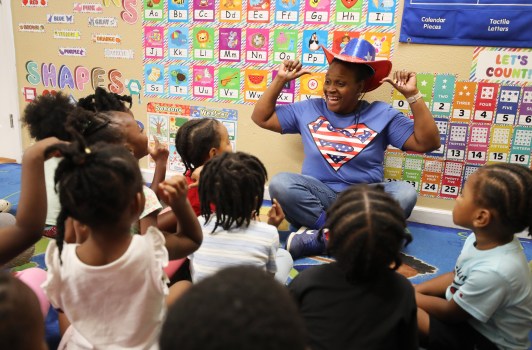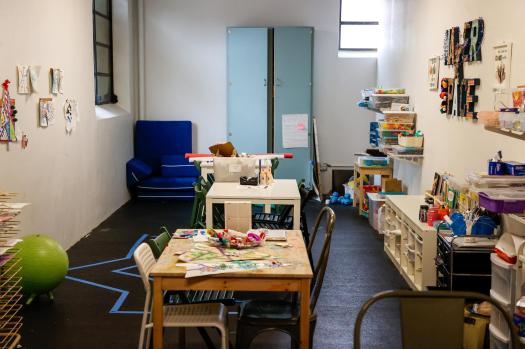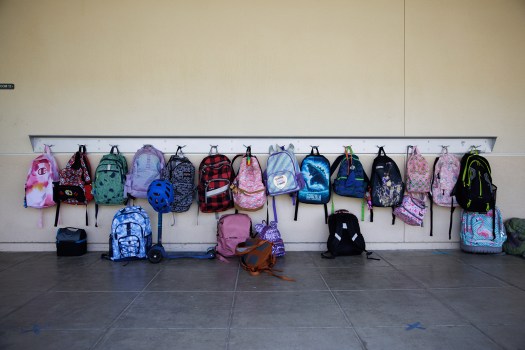They learned to disregard Mary Williams’ frequent yelling at her sons.
Williams, a single mother of two boys, aged three and four, admitted that her patience isn’t always there because she works a lot and is under pressure to keep things running smoothly. To be honest, I’m a shouting mother.
In an attempt to become a more patient and capable parent, Williams enrolled in a parenting course offered by her son’s preschool.
The free lesson was offered by Janet Adebanjo, owner of Little Angles Child Care and Learning Center in Pine Hills, who wants to assist parents in simulating the environment she aims to establish at her school at home.
We put a lot of effort into creating a stable, supportive atmosphere. For kids, stability is essential, Adebanjo stated.
The Peace and Justice Institute, a nonprofit organization in Orlando that offers training on subjects including parenting, conflict resolution, trauma understanding, and emotional intelligence, is offering the program. The Institute offers those training to companies like Little Angels for a fee.
Although an earlier version of the Institute’s Parenting Workshop was taught to hundreds of families in California with funding from the state’s Office of Child Abuse Prevention, Little Angels is the first organization in Florida to host the workshop.
Twelve women met once a week for ten weeks at the preschool to participate in the Little Angels session. Alecia Walker Jones, a teacher at Little Angles, was educated by the Institute to teach the classes in place of an instructor.
Williams arrived with the intention of reducing the amount of stress in her house.
I was interested in learning new techniques for scheduling and kid management. And one of the main things I wanted to improve on, Williams remarked, was patience.
She expected to see an instructor holding a textbook in front of the students.
However, it went well beyond that. According to Williams, there was a feeling of sisterhood and togetherness.
During the group conversations that took place during the courses, mothers shared their experiences, offered support, and discussed various parenting techniques.
According to Jones, it was similar to a therapy session where they could have a secure environment and know that whatever they discussed would remain private.
A lesson on how childhood events influenced mothers’ development kicked off the sessions, and the ladies were invited to write down both good and bad childhood memories.
We draw these links between their childhood experiences and current circumstances. Then, according to Lucy Morse Roberts, a former Orange County schoolteacher who created the Institute’s curriculum, “give them the hope, the strength, and the peer support to make steps, positive steps, forward.”
In order to set reasonable expectations for their children’s behavior and to recognize when their child is falling behind and requires further care, the moms received training on developmental milestones.
One mother was able to see that she was holding on to her child too tightly after attending the course. According to Jones, she discovered that it was acceptable to leave her child at home with her spouse and go out for the evening.
You can watch how she’s developing every week. “I’m very happy for her,” she continued.
Williams learned to be more patient with her kids as a result of the training. Her eldest son speaks a lot.
He never stops inquiring. According to Williams, he is constantly expressing his thoughts on everything.
Frequently, Williams became irate with him and warned him to keep quiet. She now makes an effort to show her son that his mother is paying attention and to honor his urge for self-expression.
According to Williams, I should be able to guide him through the world without making him feel constrained or that he needs to remain in one spot.
Williams said the program taught her strategies, such as breathing exercises, to assist her youngest, who struggles to control his emotions, relax. Williams said she has discovered that talking to him instead of yelling works better when he is angry and has a tantrum.
The boy was distraught on the way to school one day since he had switched classes and missed his previous teacher. He requested that Williams inform the school to return him to his previous class.
Williams’ first reaction was to advise him to keep quiet and come to terms with his new instructor.
However, I thought to myself that morning, “Okay, my baby is telling me these feelings and asking me to talk to another adult about them.” Williams stated, “I want him to see and hear me do it so that he knows I’m there for him.”
She therefore made sure her son could hear her discussing her feelings with the instructors when she arrived at school that morning. His transfer to his new class was facilitated that day when his old teacher stopped by to greet him and chat for a little while.
Williams claimed that she enjoyed the weekly classes and felt bad when they ended. They helped her reduce the amount of shouting in her house and encouraged her to focus more on her kids.
“Instead of talking down to them and making them feel small, I seem more like a friend and less intimidating,” Williams said. They perceive me as someone who makes them feel at ease, even if they recognize that I am the authoritative figure.












